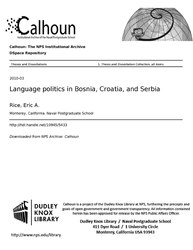File:Language politics in Bosnia, Croatia, and Serbia (IA languagepolitics109455433).pdf

Original file (1,275 × 1,650 pixels, file size: 939 KB, MIME type: application/pdf, 84 pages)
Captions
Captions
Summary
[edit]| Language politics in Bosnia, Croatia, and Serbia
( |
||
|---|---|---|
| Author |
Rice, Eric A. |
|
| Title |
Language politics in Bosnia, Croatia, and Serbia |
|
| Publisher |
Monterey, California. Naval Postgraduate School |
|
| Description |
The political union of southern Slavs in the multiethnic state of Yugoslavia came to a violent end in the 1990s. The joint Serbo--Croatian language also ceased to exist as an official language when the Yugoslav successor states Bosnia, Croatia and Serbia identified only Bosnian, Croatian and Serbian as their respective official languages. Language use in these states became a political tool used to emphasize the differences among the ethnicities and to gauge ethnic loyalty. Croatia endeavored to \"cleanse\" its language of any characteristics in common with the joint Serbo--Croatian language. Serbian nationalists rejected the Latin alphabet and insisted on using the Cyrillic alphabet. Bosniaks recognized a Bosnian language that was not acknowledged by Bosnia's ethnic Croats or ethnic Serbs. While language previously had been a means to unite Balkan Slavs, it became an instrument of nationalism wielded by politically motivated actors to widen the division among the ethnicities. Language disputes did not destroy Yugoslavia, but they may hinder recovery and modernization. As each Yugoslav successor state strives toward integration into the European Union, political questions concerning language may polarize domestic politics and inhibit regional cooperation, thereby hampering efforts to carry out needed economic and political reforms. Subjects: Language policy |
|
| Language | English | |
| Publication date | March 2010 | |
| Current location |
IA Collections: navalpostgraduateschoollibrary; fedlink |
|
| Accession number |
languagepolitics109455433 |
|
| Source | ||
| Permission (Reusing this file) |
This publication is a work of the U.S. Government as defined in Title 17, United States Code, Section 101. As such, it is in the public domain, and under the provisions of Title 17, United States Code, Section 105, may not be copyrighted. | |
Licensing
[edit]| Public domainPublic domainfalsefalse |
This work is in the public domain in the United States because it is a work prepared by an officer or employee of the United States Government as part of that person’s official duties under the terms of Title 17, Chapter 1, Section 105 of the US Code.
Note: This only applies to original works of the Federal Government and not to the work of any individual U.S. state, territory, commonwealth, county, municipality, or any other subdivision. This template also does not apply to postage stamp designs published by the United States Postal Service since 1978. (See § 313.6(C)(1) of Compendium of U.S. Copyright Office Practices). It also does not apply to certain US coins; see The US Mint Terms of Use.
|
 | |
| This file has been identified as being free of known restrictions under copyright law, including all related and neighboring rights. | ||
https://creativecommons.org/publicdomain/mark/1.0/PDMCreative Commons Public Domain Mark 1.0falsefalse
File history
Click on a date/time to view the file as it appeared at that time.
| Date/Time | Thumbnail | Dimensions | User | Comment | |
|---|---|---|---|---|---|
| current | 13:49, 22 July 2020 |  | 1,275 × 1,650, 84 pages (939 KB) | Fæ (talk | contribs) | FEDLINK - United States Federal Collection languagepolitics109455433 (User talk:Fæ/IA books#Fork8) (batch 1993-2020 #20578) |
You cannot overwrite this file.
File usage on Commons
The following page uses this file:
Metadata
This file contains additional information such as Exif metadata which may have been added by the digital camera, scanner, or software program used to create or digitize it. If the file has been modified from its original state, some details such as the timestamp may not fully reflect those of the original file. The timestamp is only as accurate as the clock in the camera, and it may be completely wrong.
| Short title | Language politics in Bosnia, Croatia, and Serbia |
|---|---|
| Author | Rice, Eric A. |
| Software used | Rice, Eric A. |
| Conversion program | Acrobat Distiller 9.3.0 (Windows) |
| Encrypted | no |
| Page size | 612 x 792 pts (letter) |
| Version of PDF format | 1.4 |

